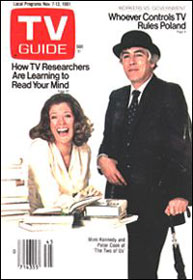|
Article is © Bill Davidson
& TV Guide.
In England, the closest thing to Woody Allen is
satirist-writer-actor-director-producer Peter Cook, who may not
be funnier than Allen, but is a head taller and considerably more
attractive. It is inconceivable that Woody Allen would go to London
for a vacation and get talked into starring in a BBC situation comedy
that might tie him up in Britain for as many as five years. But
that's exactly what Peter Cook did - in reverse - while on holiday
in Beverly Hills for a month last March. In a rash moment of avarice,
he agreed to star in the pilot of CBS's The Two of Us. As you now
know, the show was picked up as a regularly scheduled series, and
Cook is firmly in tow contractually for as long as the sitcom lasts.
Cook is rather amused by his predicament, which
he chalks up to "my atrocious ineptitude with gambling odds."
The British, however, are incensed at losing their comic genius,
even temporarily. Referring to the shanghaiing of American sailors
onto British ships, which helped the War of 1812 get going, one
tabloid ran the headline: YANKS' REVENGE: PETER COOK PRESS-GANGED
INTO HOLLYWOOD.
And so Cook currently is appearing Monday nights
at 8:30 (ET) on CBS, with Mimi Kennedy, as the acerbic, snobbish
British butler Robert Brentwood - while his own series of British
hit specials, Peter Cook and Company, must wait for hiatus time.
How could such a thing happen? Says Cook "Perhaps
it was monsoon fever. I was house-guesting in Brenda Vaccaro's cottage
during last March's big Los Angeles storms, watching Benedict Canyon,
usually a perfectly docile street, running like a brown mountain
torrent of mud and rocks. I was rather enjoying the show Mother
Nature was putting on. A Channel 2 helicopter flew overhead. I couldn't
decide whether I should send the maid out so I could watch her on
television, or whether I should run out and achieve a certain amount
of stardom for myself on the evening news.
"Just then the telephone rang. An agent friend
said that a producer named Charlie Hauck wanted to see me at CBS
regarding a new TV comedy he was preparing. I said to the agent,
'Are you quite mad? You know I'm not interested in American television
comedy, and besides, Benedict Canyon is running a river.' The agent
said, `Not to worry. Charlie will send up a four-wheel-drive military
vehicle to fetch you.' This intrigued me, so when this lorry-type
thing arrived, I went. The script wasn't bad. It was derived from
a British show called Two's Company, which Elaine Stritch had done
on TV in London. I read a few lines, and about 150 people in the
room at CBS immediately lied about how great I was. Then they offered
me the role.
"It was just a half-hour pilot. I rang up one
friend and asked him what were the gambling odds on such a TV pilot
ever becoming a series. He said, 'About 50 to 1.' I rang up another
friend and he said, 'About 200 to 1.' So I reasoned to myself: What
the hell? I'll work for a week and make this pilot and earn a lot
of American dollars, and it will be all over. With all those American
dollars, I can eat myself sick and become as fat as Robert Morley.
Then I can fulfill my ambition of outdoing 'Evita!' with a musical
called 'Farouk!', about the monstrously fat ex-king of Egypt."
Perhaps because he is basically a satirical writer,
Cook always talks like that. This sometimes makes the Peter Cook
show funnier off stage, than when he's reading someone else's lines
on stage in The Two of Us.
For example, Cook on the subject of American local-TV
news shows: "The forced camaraderie is so patently ridiculous
that I must do a skit on it sometime for England. I especially like
the vegetable section of the news in which a lady and a man exchange
meaningless chitchat whilst they fondle squashes and avocados. Then
there's the sportscaster who must always be dashing about the news-room,
lest anyone forget that he was once an athlete. This chap says that
the athletes talk to him because they trust him never to say anything
nasty: That's an interesting concept of journalism. They're willing
to reveal to him their innermost secrets about how nice they are."
Cook on the subject of American TV commercials:
"The most fascinating is the one about static cling. I had
never even heard of static cling before I came to America and saw
this young woman in a commercial with her dress so plastered to
her body that her entire anatomy is revealed beneath. George Lucas
of 'Star Wars' must have been responsible for the special effects."
Cook on the subject of his budding musical comedy,
"Farouk!". "It all began when I was out to dinner
in Hollywood with Mimi Kennedy and her husband, Larry Dilg, a fine
actor. Charlie Hauck was there, too, and we talked about the phenomenon
of Eva Peron, the villainess, becoming the heroine of a musical.
They all loved my idea of doing a similar glorification of King
Farouk. Larry began to sing, in the middle of Joe Allen's restaurant,
'Farouk you are a monster.' As he chanted, Mimi joined in with a
sweet ballad, which she improvised on the spot, 'I know the man
behind the sheet; he's really sweet.' And I added a few tidbits
of my own about rapin', pillagin' and gluttonizin'. Who knows? We
may all end up doing this on the London stage someday."
The lanky, 43-year-old Cook is equally outrageous
when discussing his own life. He says. "I was conceived in
Nigeria but born in Devon, England, because my mother had this obsession
about newborn babies catching malaria in the middle of downtown
Lagos. My father was in the British Foreign Service, a colonial
officer who eventually ran out of colonies. So I was reared in Torquay,
in the west of England, and I went to school at Radley, where the
principal social event was 'The Dance Against St. Winifred's,'
a nearby institution of learning for girls".
At 10, young Cook already was aware of absurdities
of life in general and he began to contribute items to Punch, the
world-famous British humor magazine. This would be the equivalent
today of Gary Coleman writing for The New Yorker. Says Cook, "Every
week I'd send an item to Punch for a column called `Charivaria,'
and every week I'd get a check for five guineas -it came to about
$30 in those days. I was very rich for a preadolescent. But then
I was assailed by puberty, which sapped my penchant for writing
Charivaria in some mysterious way. I never sold another item to
Punch after the age of 14."
Cook went on to Cambridge, however, where he wrote
a satirical revue for the Footlights Club, part of which a producer
combined with some sketches by Harold Pinter for a successful London
show called "Pieces of Eight." Simultaneously, another
bright young man named Dudley Moore was writing and performing satirical
sketches at Oxford. In 1959, when both were in their early 20s,
they joined forces with some other Oxonians to write and star in
a show for the Edinburgh Festival. This biting revue evolved into
the now-renowned "Beyond the Fringe," which not only was
a smash in London but also played for two years on Broadway and
won a Tony.
The original odd couple, 6-foot-2-inch Cook and
5-foot-2-inch Moore became the founding father's of an entire new
school of irreverent British comedy that still is flourishing with
the Monty Python ensemble. Cook and Moore also transmitted their
influence to Lenny Bruce and key members of Chicago's Second City
group, who appeared with them in crazy routines in their London
cabaret nightclub, The Establishment.
Cook and Moore went on to do wild movies together,
such as "The Hound of the Baskervilles" (with Cook as
a sort of rabbinical Sherlock Holmes) and "Bedazzled,"
a total mangling of the Faust legend, with Moore as a modem Faust,
Cook as the Devil and Raquel Welch as the temptress, - Lillian Lust.
The dynamic duo also did a number of hit TV comedy series in England,
such as Not Only. . . But Also, winner of two British Emmys, on
the BBC. In 1973, they did a second London stage revue, "Good
Evening," which, like "Beyond the Fringe," also came
to Broadway and also won a Tony.
To Cook's total astonishment, it also won a Grammy.
As he tells it, "I was in Detroit and I settled
down to watch the Grammy Awards on the telly in my hotel room. Suddenly
they announced the winner of the award for something called the
Best Spoken Word Recording, It was us! They said they regretted
Dudley and I weren't present to accept the Grammy, and quickly moved
on to something else. Of course we weren't present. Nobody even
had told us we were nominated." Then, with characteristic irreverence,
he quipped, "The only other nominee was Laurence Olivier -
probably for excerpts from his Polaroid commercials. The previous
year's winner was the deceased Senator Everett Dirksen. It was hardly
one of the major awards, but it looks rather attractive on the mantel
in my house in Hampstead. My winning a Grammy was almost as unlikely
as my winning an Olympic gold medal."
Although they remain close friends, the Cook-Moore
combine split up when Dudley became a big U.S. movie star in "10"
with Bo Derek. Peter remained behind in England to do his own TV
and film stints and to found the successful satirical magazine,
Private Eye, to which he contributes devastating articles, such
as "Born to be Queen: a fictitious account of Prince Charles
and Lady Di." He was living comfortably and happily in his
Hampstead house outside London and on a 5-acre estate in Buckinghamshire
with his beautiful ex-actress wife, Judy Huxtable. But then came
that visit to Beverly Hills in 1980 and the ensuing entanglement
with The Two of Us and Charlie Hauck.
Hauck says, "I never dreamed that a superstar
like Peter would be available for such a project. I had come to
Marble Arch Productions after having produced Maude, and in looking
through Marble Arch's English material, I had come across Two's
Company, which Elaine Stritch had done for them in London. I decided
it could be modified into a good American series, and I wrote a
pilot and a concept that we sold to CBS. But finding a good British
actor to play the butler proved to be almost impossible. I was about
to fly to London to take up the search when someone told me Peter
was in town. I knew it was a long shot - the best I could have hoped
for was an actor like Peter Cook - but I sent that four-wheel-drive
vehicle to fetch him in the storm. I was astounded when he said
he'd do the pilot."
Cook rather likes the show, now that it has settled
into being a regular series. He says, "It's an amusing little
spoof of all haughty British butlers, going back to Arthur Treacher.
I've studied them all in my preparation for the series. Also, it's
a delight working with Mimi Kennedy. Probably because of her improvisational
theater training, she is much like the young ladies with whom I
work back home. I am, shall we say, an idiosyncratic actor, but
I've never been able to upset her aplomb with my little tricks.
She always responds in kind."
Mimi remains amazed that she's working with Cook.
"When I was doing the 'National Lampoon Show' on the stage,"
she says, "Peter Cook was almost like a god to us. I was terrified
when I first met him, but he got to like me because I could sing
ridiculous, obscure rock songs from the early 1960s. When we meet
every morning in the makeup room, I break him up with those silly
rock lyrics, and he tears me apart with his insane wit. For example,
he told me he had been reading the best-seller lists in The New
York Times book section, and that he had two books in mind that
would make the lists overnight. The first was to be printed on rice
paper and would be cal led 'Eat This Book and Lose Ten Pounds.'
The title of his second proposed best seller was 'How to Buy Five
Million Dollars of Real Estate with No Money Down, and Lose Forty
Pounds, and Improve Your Sex Life, and Destroy your Enemies'."
Cook has an option in his contract to write episodes
of The Two of Us if he so chooses. But he does not so choose, preferring
to retain his crazy, aberrational imagination for his own future
shows in England.
What a pity.
go to > > > TV NEWS
feature
|


